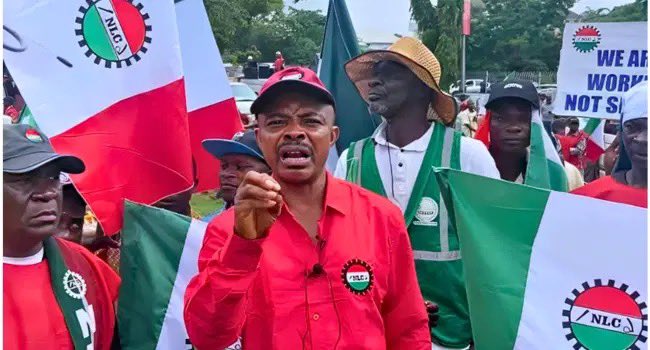
NLC Declares Nationwide Strike Over Dangote Refinery Labour Dispute

The Nigerian Labour Congress (NLC) has declared an indefinite nationwide strike following what it described as the Dangote Group’s blatant disregard for workers’ rights, anti-labour practices, and continuous violation of the country’s labour laws. The industrial action, announced after an emergency National Executive Council (NEC) meeting in Abuja, is expected to paralyze key sectors of the economy as affiliate unions across the federation have been directed to mobilize their members in full compliance with the directive. According to NLC officials, the strike is not just about workers at the Dangote Refinery but a broader battle for the dignity and protection of Nigerian workers whose welfare, they argue, has increasingly come under attack by powerful corporate entities.
The NLC president, Joe Ajaero, in a strongly worded statement, accused the Dangote Group of engaging in unfair labour practices including mass casualization, arbitrary dismissals, denial of the right to unionize, and unsafe working conditions. He lamented that despite repeated attempts by the union to engage management in dialogue, the company allegedly ignored all efforts and continued to trample on workers’ rights with impunity. Ajaero declared that Nigerian workers would no longer tolerate what he described as a modern form of slavery disguised as employment, warning that the Dangote case is only a reflection of a deeper crisis in the country’s industrial relations system.
Reports indicate that tensions between the NLC and the Dangote Refinery have been brewing for months, with workers raising grievances about low pay, excessive working hours, and the refusal of management to recognize unions. The situation escalated when several employees were allegedly dismissed for attempting to form a workers’ association, a move the labour body condemned as illegal and provocative. NLC leaders argue that the Dangote Group, despite its global image as Africa’s leading industrial conglomerate, is exploiting Nigerian workers under conditions that would not be tolerated in other parts of the world.
The Dangote Refinery, inaugurated amid much fanfare as Africa’s largest oil refining facility, has been hailed as a game-changer for Nigeria’s energy sector. With a capacity to process 650,000 barrels of crude oil per day, the refinery is expected to end Nigeria’s decades-long dependence on imported refined petroleum products. However, the current labour dispute threatens to cast a shadow over its operations, raising concerns about potential disruptions in fuel supply, logistical chains, and the broader economy. Already, oil workers’ unions, transport workers, and allied sectors have indicated their readiness to comply with the NLC’s strike order, a development that could grind economic activities to a halt if the deadlock persists.
Government officials have expressed concern over the looming strike, warning that it could further worsen the already fragile economic situation of the country. Sources within the Ministry of Labour and Employment revealed that frantic efforts are being made to intervene and broker a truce between the parties. The Minister of Labour, who has scheduled an emergency meeting with both the NLC and Dangote representatives, appealed for restraint, urging workers not to shut down essential services while negotiations are ongoing. He admitted that the grievances raised by the labour union were serious and must be addressed in line with the provisions of the Nigerian Labour Act, but stressed that industrial peace must not be sacrificed in the process.
The Dangote Group, on its part, has denied allegations of violating labour laws, insisting that it has maintained fair labour standards and provided thousands of jobs to Nigerians at a time when unemployment remains a pressing national crisis. In a press release, the company stated that while it recognizes the right of workers to demand better conditions, the accusations leveled against it by the NLC were exaggerated and misleading. It maintained that issues of employment classification, safety, and unionization were being handled in accordance with international best practices, and accused the labour congress of playing politics with the matter. The company further appealed to the government to prevent the strike, warning that halting refinery operations could have devastating consequences for the nation’s fuel security.
But the NLC insists that the Dangote case represents a broader pattern of corporate impunity in Nigeria, where powerful businesses often operate above the law due to their economic influence. Labour leaders argue that unless a strong stand is taken, other corporations will follow suit, leaving millions of Nigerian workers vulnerable to exploitation. The congress has therefore vowed to continue with the strike until the Dangote Group complies fully with labour laws and reinstates the dismissed workers. Ajaero emphasized that the industrial action is not a bargaining chip but a moral crusade to restore fairness, justice, and dignity in the Nigerian workplace.
Across the country, reactions to the strike announcement have been swift and divided. Civil society groups, human rights activists, and some political figures have thrown their weight behind the NLC, praising it for standing up against what they see as corporate tyranny. Social media has been awash with hashtags such as #StandWithWorkers and #NLCStrike, with many Nigerians calling for solidarity with the affected employees. On the other hand, some business leaders and economic analysts have criticized the move, warning that a nationwide shutdown at this critical time could plunge the economy deeper into crisis, scare away investors, and jeopardize the refinery’s potential to stabilize fuel prices in the long run.
As the countdown to the strike begins, uncertainty looms over Nigeria’s economic and industrial landscape. Analysts warn that if the standoff drags on, the impact could be severe, ranging from fuel scarcity to transport disruptions, supply chain breakdowns, and a loss of investor confidence. Some have urged President Bola Tinubu’s administration to take decisive action by mediating between the parties and ensuring strict enforcement of labour laws, regardless of the economic clout of the Dangote Group.
The unfolding crisis underscores a larger question about the balance of power between capital and labour in Nigeria. For decades, workers have accused successive governments of paying lip service to labour rights while pandering to the interests of big corporations. With the NLC’s strike against the Dangote Refinery, many see an opportunity for a watershed moment that could reshape the dynamics of labour relations in the country. Whether it ends in compromise, confrontation, or systemic reform remains to be seen, but one thing is certain: the nation is bracing for a storm that could redefine the struggle for workers’ rights in Africa’s largest economy.


